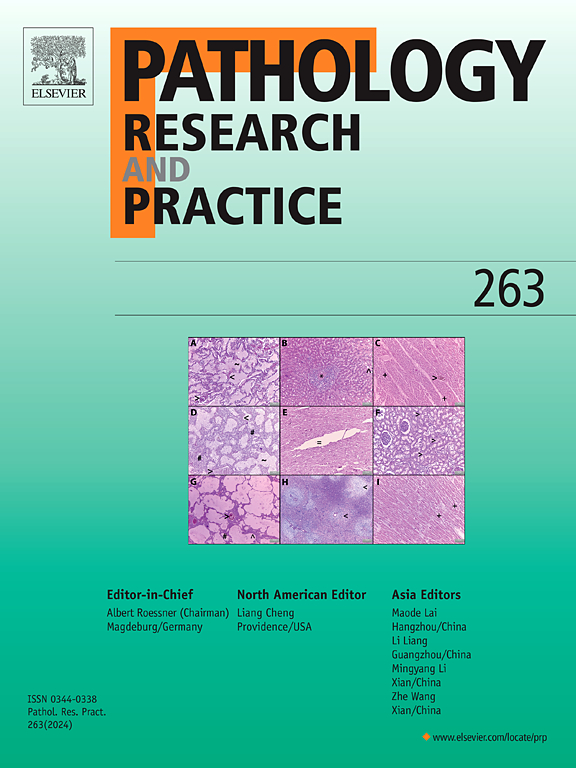米屈肼通过调节胰腺和结肠肿瘤细胞的 MAPK 信号通路激活自噬、旁噬和铁噬。
IF 2.9
4区 医学
Q2 PATHOLOGY
引用次数: 0
摘要
Micheliolide (MCL)是一种天然倍半萜内酯,通过诱导各种程序性细胞死亡机制而显示出显著的抗癌特性。本研究旨在探讨 MCL 对胰腺癌和结肠癌细胞自噬、旁噬和铁噬的影响,以及它对 MAPK 信号通路的调节作用。研究发现,MCL 能显著抑制这些癌细胞的细胞活力,尤其是在 MIA PaCa-2 和 HT-29 细胞系中。研究发现,MCL 可通过提高 Atg7、p-Beclin-1 和 Beclin-1 等自噬标记物的水平来诱导自噬,而自噬抑制剂 3-MA 可抑制自噬。此外,研究还发现,MCL 能促进副aptosis,表现为 Alix 水平降低,ATF4 和 CHOP 水平增加。它还能促进铁跃迁,表现为 SLC7A11 表达减少、TFRC 水平升高和细胞内铁增加。此外,MCL 还激活了 MAPK 信号通路,表现为 JNK、p38 和 ERK 的磷酸化,这与 ROS 生成的增加有关,而 ROS 对调节这些细胞死亡机制至关重要。这些研究结果表明,MCL 是一种多功能抗癌剂,能够通过调节 MAPK 信号转导和 ROS 水平激活各种细胞死亡途径。这些结果强调了 MCL 在治疗癌症方面的治疗前景,并指出有必要进行进一步的体内研究,以证实这些作用并确定其潜在的临床用途。本文章由计算机程序翻译,如有差异,请以英文原文为准。
Activation of autophagy, paraptosis, and ferroptosis by micheliolide through modulation of the MAPK signaling pathway in pancreatic and colon tumor cells
Micheliolide (MCL), a naturally occurring sesquiterpene lactone, has demonstrated significant anticancer properties through the induction of various programmed cell death mechanisms. This study aimed to explore MCL's effects on autophagy, paraptosis, and ferroptosis in pancreatic and colon cancer cells, along with its modulation of the MAPK signaling pathway. MCL was found to substantially suppress cell viability in these cancer cells, particularly in MIA PaCa-2 and HT-29 cell lines. The study identified that MCL induced autophagy by enhancing the levels of autophagy markers such as Atg7, p-Beclin-1, and Beclin-1, which was attenuated by the autophagy inhibitor 3-MA. Furthermore, MCL was found to facilitate paraptosis, indicated by decreased Alix and in-creased ATF4 and CHOP levels. It also promoted ferroptosis, as demonstrated by the reduced expression of SLC7A11, elevated TFRC levels, and increased intracellular iron. Additionally, MCL activated the MAPK signaling pathway, marked by the phosphorylation of JNK, p38, and ERK, linked with an increase in ROS production that is vital in regulating these cell death mechanisms. These findings propose that MCL is a versatile anticancer agent, capable of activating various cell death pathways by modulating MAPK signaling and ROS levels. These results emphasize the therapeutic promise of MCL in treating cancer, pointing to the necessity of further in vivo investigations to confirm these effects and determine its potential clinical uses.
求助全文
通过发布文献求助,成功后即可免费获取论文全文。
去求助
来源期刊
CiteScore
5.00
自引率
3.60%
发文量
405
审稿时长
24 days
期刊介绍:
Pathology, Research and Practice provides accessible coverage of the most recent developments across the entire field of pathology: Reviews focus on recent progress in pathology, while Comments look at interesting current problems and at hypotheses for future developments in pathology. Original Papers present novel findings on all aspects of general, anatomic and molecular pathology. Rapid Communications inform readers on preliminary findings that may be relevant for further studies and need to be communicated quickly. Teaching Cases look at new aspects or special diagnostic problems of diseases and at case reports relevant for the pathologist''s practice.

 求助内容:
求助内容: 应助结果提醒方式:
应助结果提醒方式:


